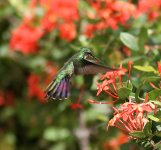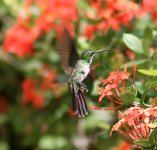steve covey
Jack of all Orders - Master of None
Hi all, as promised I'm back with another puzzler from my friends visit to the Dominican Republic. As always I'll jump in with both feet and open myself to ridicule with my best guess first
Could this be a female Hispaniolan Emerald Hummingbird?
TIA,
Steve.
[another coming soon - this time a heron sp.]
Could this be a female Hispaniolan Emerald Hummingbird?
TIA,
Steve.
[another coming soon - this time a heron sp.]





